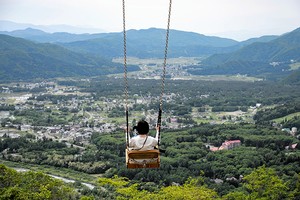THE ASAHI SHIMBUN
April 29, 2023 at 07:00 JST
From liquid-free shampoo to zero-gravity adhesives, companies have answered the Japan Aerospace Exploration Agency’s call for products that can make life easier for astronauts on the International Space Station (ISS).
Astronauts on the ISS use dry shampoo, water and a towel to wash their hair. But water is limited on the station, and the crew must be careful not to let any liquid splash around in the zero-gravity environment.
Tokyo-based daily goods producer Kao Corp. developed the 3-D Space Shampoo Sheet that allows users to easily cleanse the scalp and hair with one hand.
The sheet-type product contains a dry cleansing solution, eliminating the need for shampoo liquid.
Raised bumps on the uneven sheet surface wipe away sebum and dirt when in direct contact with the scalp.
The product was originally developed for hospitalized patients and others who had trouble washing their hair.
In 2020, JAXA solicited ideas for daily goods that could solve problems common both in space and on Earth.
A Kao employee at its hair care laboratory believed that astronauts might have trouble washing their hair. That led the company to redesign the original shampoo sheet for space travelers.
The sheet, soaked with a cleansing solution during the production process, is ready for use when it is taken out of the package.
Because ethanol and other alcohol-based liquids are not allowed on the ISS, the cleansing solution is made with alcohol-free ingredients.
JAXA approved the product. And it was brought to the ISS from October 2022 to March this year, when Japanese astronaut Koichi Wakata, 59, was on board.
“I can wash my hair really clean even in the space station, where there is no bath or shower,” Wakata said. “It leaves a really refreshing sensation.”
Kao released a limited number of its commercial editions online for terrestrial users. It sold out in five days, the company said, adding that it will consider a full-scale sales effort.
“We think it can be used not only in space but also in hospitals, care facilities and outdoor situations,” said Eiji Terada, head of Kao’s health and wellness business department.
BUSINESS OPPORTUNITIES
In a video clip shot in the ISS, Wakata pointed out another problem in outer space.
“You can easily lose things in zero-gravity conditions,” he said. “This product is meant to solve that problem.”
The video introduces Fixpace, a double-faced adhesive tape developed with technology for medical-use patches.
It was released by Hisamitsu Pharmaceutical Co., which is based in Tosu, Saga Prefecture, and is known for its Salonpas pain-relieving adhesive patch.
Fixpace can hold ballpoint pens, scissors and other items when stuck on a wall or a table.
Although it is not commercially available, the company said it is exploring if Fixpace can be adapted for purposes other than space applications.
Other companies have commercially released products originally developed for space use.
Osaka-based cosmetics manufacturer Mandom Corp. offers its Shower Paper body wash sheet for 1,100 yen ($8), including tax. It gives a refreshing coolness even though it is ethanol free.
The company hopes it will also come in handy for people with sensitive skin, infants and those in need of nursing care.
Tsuyomi Inc., which is based in Ichinomiya, Aichi Prefecture, and develops oral care products, is preparing to commercially release its toothpaste tablet.
“While working with private companies, we aim to promote innovation and create business in the livelihood and health care fields to make our lives in space and on the ground more comfortable,” said Yumi Nakajima, a member of JAXA’s Business Development and Industrial Relations Department.
Hidetaka Aoki, director of Space Port Japan Association, a general incorporated association, is hopeful about the future prospects for such development efforts.
Referring to the fact that Tempur pillows were originally based on National Aeronautics and Space Administration (NASA) research, Aoki said: “For example, clothes that can be worn without being washed can also be used in disaster areas on the ground. Such development efforts can prompt daily goods manufacturers to seek previously unexpected sources of earnings.”
(This article was written by Yoko Masuda and Takeshi Suezaki.)




















A peek through the music industry’s curtain at the producers who harnessed social media to help their idols go global.
A series based on diplomatic documents declassified by Japan’s Foreign Ministry
Here is a collection of first-hand accounts by “hibakusha” atomic bomb survivors.
Cooking experts, chefs and others involved in the field of food introduce their special recipes intertwined with their paths in life.
A series about Japanese-Americans and their memories of World War II